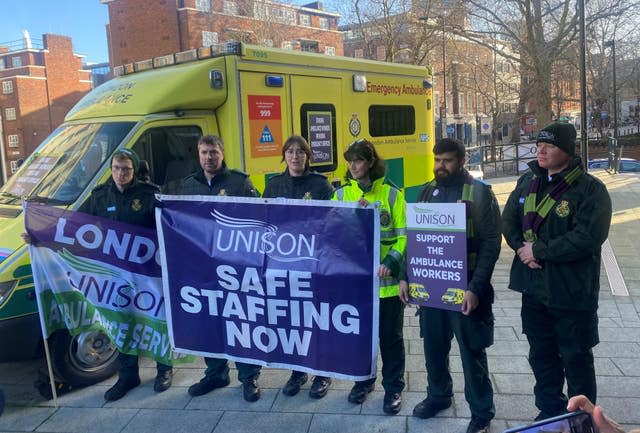We will not submit evidence to pay review body during disputes – health unions
Health unions will not be submitting evidence to the NHS pay review body for the next wage round while the current industrial disputes remain unresolved, it has been announced.
The 14 unions, representing more than one million ambulance staff, nurses, porters, healthcare assistants, physiotherapists and other NHS workers in England, have called for direct pay talks with ministers.
Unions said they believe the lengthy pay review body process is not able to deliver a deal that resolves the current pay and staffing dispute, which has led to a series of strikes, including a walkout by ambulance workers on Wednesday.
Officials said that in the current economic climate it would be better if NHS pay negotiations could be convened involving unions, employers and ministers.
They said that the deadline for submitting evidence for the 2022/23 pay year was the end of last January, but it was almost six months later when ministers made public their acceptance of the review body’s £1,400 flat-rate rise.
By then inflation had “gone through the roof”, say unions.
The unions have now decided against a formal collective submission to the pay review body this year, preferring the more direct approach of talks with ministers.
Evidence for the 2023/24 pay round is meant to be submitted today.
Instead, the NHS unions have collated the case for investment in NHS pay into a publicly available document.
This outlines the necessity of investment in pay and staffing to the health service, its staff, patients and the wider economy.
Unions have accused the Government of “hiding behind” the pay review body.
Chairwoman of the NHS group of unions, and Unison’s head of health, Sara Gorton said: “The pay review body process doesn’t fit the current context.
“The NHS staffing crisis is so acute only prompt action on pay, both for this and the next financial year, can start to turn things around.
“The public knows ambulance response times are worsening and hospital waiting lists growing because the NHS no longer has the necessary staff to meet demand, nor provide safe patient care.
“Ministers must seize the initiative, get everyone around the table and negotiate a way to the best deal for staff, patients and services.”
Secretary of the NHS group of unions, and Chartered Society of Physiotherapy assistant director of employment relations, Elaine Sparkes, said: “Solving the pay dispute, getting vacancy rates down and providing better patient care must be the Government’s number one priority.
“But even if the review body process were to be hurried along, as the health secretary says he’s keen to do, it would still take too long.
“Speed is of the essence, as is ensuring wages are high enough for the NHS to retain experienced staff and attract new recruits. Only direct talks can achieve that.”
Unite general secretary Sharon Graham said: “The NHS Pay Review Body (NHSPRB) is long past its sell-by date. It’s no longer independent of Government and it doesn’t have powers to make major decisions about pay. So what is the point of it?
“The fact of the matter is the NHSPRB has presided over more than a decade of real wage cuts for almost all NHS staff. It has been a smokescreen which has allowed Government to drive the NHS to the point of collapse.”
The 14 NHS unions are: British Association of Occupational Therapists, British Dietetic Association, British Orthoptic Society, Chartered Society of Physiotherapy, Royal College of Podiatry, Federation of Clinical Scientists, GMB, Managers in Partnership, Prison Officers Association, Royal College of Midwives, Royal College of Nursing, Society of Radiographers, Unison and Unite.
Steve Brine MP, chairman of the Commons health and social care committee, said the independent pay review process for 2023/24 should be made “swifter” with a view to solving the current NHS industrial dispute.

The former Conservative health minister said he thought it a “huge strategic error” on the part of health unions not to engage with the process, and instead urged union leaders to “talk it up and stand behind it”.
Speaking to BBC Radio 4’s World At One, Mr Brine said: “We are less than three months away from the end of the current pay review process.
“That process doesn’t actually report, according to schedule, until September and then it is backdated to April 1.
“My view is that the pay review report that came out last year — it was 188 pages long, it was a comprehensive piece of work — I don’t think they need to take until September.
“I think they need to do a much swifter piece of work, taking into account the cost-of-living challenges, and I think that can give great hope to the unions.”
On the possibility that ministers could offer a one-off payment to solve the current stalemate, Mr Brine said: “I don’t think that’s gone away, I think it is still a discussion within Government.”


